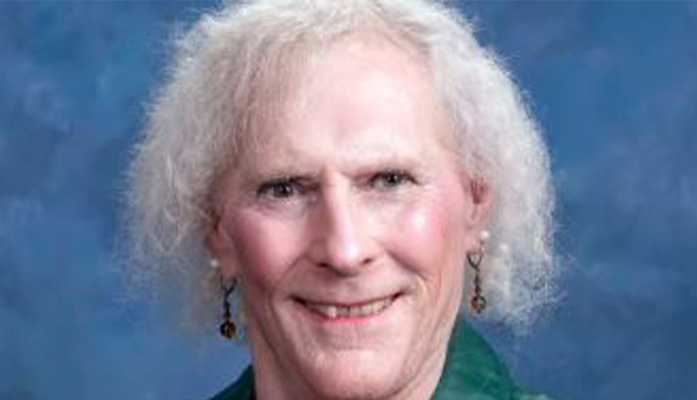
by Corinne Murdock | Jan 17, 2023 | News
By Corinne Murdock |
An Arizona mother alleged that a transgender school board member stared at her bare chest in her gym’s locker room last week.
Paul Bixler, a man who professes to be a woman, has sat on the Liberty Elementary School District (LESD) Governing Board since 2021. The mother, Lindsey Graham, who goes by the persona “Patriot Barbie” online and is affiliated with conservative activist group Turning Point USA, claimed in a viral video that Bixler looked at her bare chest as she was undressing in the women’s locker room. Graham called police for help. However, law enforcement reportedly informed Graham that the incident wasn’t grounds for arrest.
“He is a man in the women’s locker room, and the response was that this is a ‘touchy, sensitive issue in society,’” said Graham. “Women’s rights are being violated and I’m not going to put up with it.”
Bixler reportedly told police that he had his genitals removed surgically and the gender on his driver’s license changed from male to female. Arizona law requires individuals to receive a doctor’s letter testifying that they’re “irrevocably committed” to changing their gender and that they have received “appropriate clinical treatment.”
“He cut off his weiner, so now he’s a woman?” asked Graham.
Graham said the experience caused her to question what facilities Bixler uses on school property.
Libs of TikTok, a popular conservative account that reposts and reports on left-wing content, picked up the already-viral video, resulting in the encounter to receive millions of views.
Some online users accused Bixler of voyeurism in their comments.
Others insinuated Graham orchestrated the encounter, pointing to her viral public commentary at an LESD board meeting last year. In a response video posted to Instagram, Graham denied accusations against her, including that she was waiting for Bixler to come to the gym, that she signed up for the gym knowing he worked out there, and that she’d been harassing and stalking him.
“I don’t care what the narrative is,” said Graham. “I care about this: did he violate women’s rights? Yes. Will he violate other girls and women? Yes. Is it my duty to fight against his delusions to protect other little girls? Yes.”
Days before the incident went viral, Bixler was featured in an article claiming that he’s been targeted by community members over his transgenderism. Bixler also insisted that transgenderism isn’t a choice, in response to critics’ claims to the contrary.
Bixler began dressing as a woman after his wife died in 2017. On his Facebook profile, last active in 2020, he listed his gender as “male.”
Bixler made headlines last January after he testified against parental rights before the Arizona legislature. Bixler argued that educators shouldn’t have to disclose a child’s sexuality and gender identity to their parents.
“When you threaten a child’s disclosure with exposure, those children will continue to question but will not seek the highly qualified individuals that could assist them. Threatening dedicated, trained caregivers with litigation also threatens the welfare of the children within that same population,” stated Bixler. “When you marginalize this student population and force them to go into hiding, they won’t stop questioning. They simply will not receive the help that they need.”
Prior to sitting on a school board, Bixler worked in Arizona public schools for over 30 years as a teacher, principal, administrator, and even coach. Bixler ran uncontested in his school board race.
Corinne Murdock is a reporter for AZ Free News. Follow her latest on Twitter, or email tips to corinne@azfreenews.com.

by Corinne Murdock | Jan 16, 2023 | News
By Corinne Murdock |
The attorney general’s office secured the discontinuance and restitution of Companion Pets, Inc. (CPI), an established puppy retailer in the Valley who sources from unlicensed and neglectful breeders.
According to the attorney general’s report, CPI sold approximately 6,000 dogs per year in its stores online, animalkingdomaz.com, and in-person through their Animal Kingdom and Puppies ‘N Love shops located in Tempe, Gilbert, Glendale, and Tucson. They were located in the Arizona Mills, Arrowhead Town Center, SanTan Village, and Tucson Mall.
READ THE COURT ORDER HERE
As part of its assurance of discontinuance, CPI must clearly identify the sources of the animals it placed for sale, accurately display the name and USDA-licensing status of the breeders and brokers from whom it obtained animals, cease offering dogs for sale that come from breeders or brokers cited for violations of the USDA’s Animal Welfare Act, and cease releasing dogs to consumers known to have parasites without informing the consumer verbally and in writing and advising whether the dog requires further treatment.
With the ordered shutdown, CPI must pay the state $120,000 in restitution. CPI customers seeking restitution must have purchased a puppy from the listed retailers between Jan. 1, 2017, and Dec. 31, 2022, have made their purchase in Arizona or lived in Arizona at the time of purchase, and file a complaint with the attorney general’s office within 120 days after the court signs the assurance of discontinuance order (estimated to be mid-April 2023).
Those interested in reviewing the list of CPI’s breeders may do so here.
Investigations into CPI first began in February 2020, the month before President Donald Trump first declared a national state of emergency for COVID-19. That September, an animal cruelty prevention organization, Animal Wellness Action, released a report with detailed allegations of CPI sourcing from unlicensed and penalized breeders.
READ THE REPORT HERE
In a press release late last month, former Attorney General Mark Brnovich emphasized the importance and duty of ensuring animals’ welfare, as well as preventing seller misrepresentation.
“The addition of a dog is an important, emotional decision for any family,” said Brnovich. “It is imperative that consumers be given truthful information about the source and the health of animals that will become family members.”
This more recent discovery of CPI’s perpetuation of animal neglect and abuse hearkens back to past controversies.
When Tempe attempted to ban breeder sales in 2016, CPI petitioned the state legislature to override the policy. They succeeded, securing SB1248.
At the time, CPI defended their lobbying against critics that the bill enabled puppy mill sales. CPI’s marketing director alleged that the bill doesn’t allow CPI to evade the law, nor did CPI violate any other laws. CPI founder and owner, Frank Mineo, added that they would “never” buy puppies from puppy mills. Mineo has been a public advocate for responsible breeding and proper animal care.
“[W]e go above and beyond even the U.S.D.A. regulations when selecting our breeders. We only buy puppies from breeders whom we know, trust and who treat all of their dogs (puppies and adults alike) with veterinary care and compassion and whose kennels show a commitment to animal welfare,” stated Mineo. “SB1248 has the potential to put pet store owners who buy puppies from puppy mills out of business so we support the bill. Puppy mills are deplorable, but putting us out of business does nothing to shut them down, it merely perpetuates a bigger black market for puppies to be sold by unregulated and unscrupulous people with no oversight at all.”
According to its Greater Phoenix Chamber profile, CPI began in Buffalo, New York and has existed for over 50 years. Over the past 44 years, CPI expanded into Arizona and then sold the majority of its stores to Petco. Then, CPI transitioned to puppy sales within local malls as well as a 17,000-foot aquarium and fish store in Phoenix, The Ocean Floor.
CPI claimed on its website that it vets breeders thoroughly because it takes the health and welfare of its puppies seriously. CPI also claimed that it based its breeder investigations on USDA inspection records and their own in-person examinations, which they alleged to conduct every year.
“Our goal is to provide happy, healthy lifelong pets to the individuals and families who shop our stores and our breeders are chosen with this in mind,” stated CPI.
CPI also sold dog and fish products, including their own brand of dog food: Earthblend.
As of press time, CPI’s website was live and their puppy listings remained up.
Corinne Murdock is a reporter for AZ Free News. Follow her latest on Twitter, or email tips to corinne@azfreenews.com.

by Corinne Murdock | Jan 15, 2023 | News
By Corinne Murdock |
Amazon founder Jeff Bezos’ ex-wife, MacKenzie Scott, is using her $38.3 billion divorce settlement in part to fund over a dozen leftist Arizona groups dedicated to equity over equality.
The following received at least $72.54 million collectively from Scott over the past three years:
- $25 million: Valley of the Sun United Way
- $10 million: Florence Immigrant & Refugee Rights Project
- $10 million: United Way of Tucson and Southern Arizona
- $8.5 million: Habitat for Humanity – Central Arizona
- $3.5 million: Boys & Girls Clubs of Tucson
- $2.8 million: Girl Scouts – Arizona Cactus-Pine Council
- $2.5 million: Vista College Preparatory
- $2 million: YMCA of Southern Arizona
- $1.4 million: Girl Scouts of Southern Arizona
- $1 million: YWCA Metropolitan Phoenix
- Undisclosed amount: YWCA Southern Arizona
- Undisclosed amount: Easterseals Southwest Human Development
- Undisclosed amount: Greater Phoenix Urban League
Valley of the Sun United Way received its millions as part of a five-year initiative to advance equity in all aspects of society. Under the modern social justice lens, equity factors an individual’s need rather than affording equal treatment to everyone.
Florence Immigrant & Refugee Rights Project provides legal and social services to illegal immigrants facing deportation.
United Way of Tucson and Southern Arizona focuses its efforts on dismantling structural racism, with an equitable approach in its community service.
Habitat for Humanity, the household name for nonprofit housing assistance, joined the 2020 Black Lives Matter (BLM) bandwagon. Since then, the nonprofit committed to anti-racism and reframing its community service through racial and social equity rather than equality.
The same was true for the Boys & Girls Clubs of Tucson, and both YMCAs. The Valley of the Sun YMCA has participated in the Phoenix Pride Parade, and the Tucson YMCA has an outreach committee dedicated to diversity and inclusion.
Girl Scouts allows transgender girls to join troops on a case-by-case basis. If the community recognizes the boy as a girl, then the troop allows him to join. Their non-discrimination clause states that they accept children regardless of their gender identity.
Vista College Prep, a tuition-free public charter school, states that its mission is “Equity for all students to achieve their full potential.”
YWCA Southern Arizona’s mission is to eliminate racism and ensure equity for women — mostly, Black women.
In addition to advancing equity, Easterseals Southwest Human Development, an early childhood development organization, advances a concept of systemic racism positing that babies can be racist.
The Greater Phoenix Urban League also determines its distribution of community service through an equity lens.
Scott also gave an undisclosed amount to the Movement for Black Lives, a California-based Black Lives Matter (BLM) affiliate whose $30.6 million was fiscally sponsored by the Tucson-based Alliance For Global Justice (AFGJ).
Corinne Murdock is a reporter for AZ Free News. Follow her latest on Twitter, or email tips to corinne@azfreenews.com.

by Corinne Murdock | Jan 15, 2023 | Education, News
By Corinne Murdock |
The University of Arizona (UArizona) College of Medicine epitomizes diversity, equity, and inclusion (DEI) best practices, based on the latest report released by the Association of American Medical Colleges (AAMC).
The AAMC released a report in November assessing the DEI efforts at its 157 U.S. schools, 14 Canadian schools, and about 400 teaching hospitals and medical centers (including the Department of Veterans Affairs medical centers), and 80 academic societies. AAMC quantified its DEI assessment through a “Diversity, Inclusion, Culture, and Equity (DICE) Inventory” consisting of 89 questions. UArizona’s College of Medicine campuses in Tucson and Phoenix qualify for high DICE Inventory scores based on the report.
Both campuses have DEI offices, though the Phoenix campus has an Office of Equity, Diversity, and Inclusion while the Tucson campus has an Office of Diversity, Equity, and Inclusion. Though both are through UArizona, each college of medicine charts slightly different paths for achieving DEI goals.
UArizona’s College of Medicine in Tucson (COMT) requires all faculty, staff, residents, fellows, graduate students, and medical students to complete six hours of DEI credit during the year. This includes an “Implicit Association Test.” The linked test directs users to “Project Implicit” by Harvard University, and offers 15 different tests of one’s implicit association of skin tone, gender science, weight, Asian Americans, Native Americans, race, sexuality, weapons, gender and careers, disability, religion, Arabs and Muslims, age, transgender people, and presidents.
A DEI credit is also eligible through the college’s DEI book club. Books read this past year include “Dying of Whiteness” and “Beautiful Country: A Memoir of an Undocumented Childhood.”
Each department at UArizona COMT has a “Diversity Champion,” or a DEI designee. Nearly every month, the college hosts a diversity lecture. In August, attendees learned about how unconscious racial bias impacts clinical care; in October, attendees learned about LGBTQ-inclusive climate initiatives.
UArizona COMT’s diversity statement includes an acknowledgement that the campus exists on indigenous land and territory. It expresses a commitment to diversity through increasing diversity of students, residents/fellows, faculty and staff as well as hosting culturally relevant activities. The college also includes a breakdown of its demographics across faculty, staff, medical students, graduate students, undergraduate students, and residents.
UArizona COMT also has an anti-racism initiative tasked with reforming the school’s operations, such as admissions and curriculum. The sub-committees assigned to this initiative achieved certain reforms, such as changing the selection process for the medical honorary to admit more underrepresented minorities, as well as implementing a racism and discrimination reporting system.
UArizona’s College of Medicine in Phoenix (COMP) employs many similar, though different DEI initiatives.
Following George Floyd’s death in May 2020, UArizona COMP issued a joint statement with AAMC, the American Medical Association (AMA), Accreditation Council for Graduate Medical Education, and Arizona Medical Association condemning racism and declaring racism a public health problem.
Then last year, UArizona COMP joined 10 other medical schools nationwide in the “Anti-Racist Transformation in Medical Education” initiative. So far, they’ve secured nearly $500,000 in scholarship funding for underrepresented student populations, created a four-year anti-racist curriculum, developed faculty on teaching anti-racist medicine, and included an anti-racist medicine statement into each clerkship orientation.
Additionally, the Phoenix campus has launched its own 12 action steps for DEI achievement.
As of September 2021, they reported achieving three of these 12 steps: creating a scholarship fund for medical students interesting in serving the underserved Black/African American community, supporting the formation of employee resource groups for faculty and staff of color and other groups, and issuing a statement on the college’s website recognizing racism as a public health issue in line with AAMC and AMA.
The other nine steps are ongoing. So far, the college has achieved its “most diverse” class in history with 22 percent underrepresented minorities, established a “post application review” program focused on underrepresented minority applicants denied admission, gathered demographic profile information for a diversity review, hired managers in the selection of search committee members to increase diversity of Black and other underrepresented minority staff, established unconscious bias and cultural competency training for residents, prospected for Endowed Chair of Health Justice and Equity Research, drafted unconscious bias training for all faculty/students/staff/residents/fellows/postdocs, approved anti-racism curriculum, and secured funding for an underrepresented minorities mentor director.
Additionally, the college recognized last month as Equity, Diversity, & Inclusion Health Month. Students who attend most of the eight DEI events scheduled this month may earn “Diversity Hour” credits. These credits aren’t compulsory. However, students who earn 50 Diversity Hours receive a Distinction for Inclusive Excellence on their Dean’s Letter upon graduation.
The events included discussions of female nurses who served Tuskegee Airmen, ableism, Asian American and Native Hawaiian/Pacific Islander immigration, and Native American, Asian American, and Latino physicians and patients.
Similar to the Tucson campus, UArizona COMP has faculty from different departments serving as DEI designees called “Inclusive Excellence Champions.”
Corinne Murdock is a reporter for AZ Free News. Follow her latest on Twitter, or email tips to corinne@azfreenews.com.

by Corinne Murdock | Jan 14, 2023 | News
By Corinne Murdock |
The newly appointed head of the Arizona Department of Child Safety (DCS) wants to make child services interventions equitable.
Governor Katie Hobbs appointed Matthew Stewart last month following a ProPublica-NBC News report in December alleging that racial disparities plagued the DCS. The report featured Stewart as evidence of the alleged disparity issue.
According to the investigative report, DCS investigations increased for Black families while overall DCS investigations went down
Stewart worked at DCS for over a decade, first as a case manager then training supervisor. Stewart told reporters that he’d discovered the alleged racial disparity in 2018, but didn’t leave the agency for another two years. Afterwards, Stewart founded a nonprofit advocating for keeping families together, Our Sister Our Brother (OSOB). Their website ceased being public around the time of Stewart’s appointment. (An archive of the latest version of the website is available here). According to Stewart’s LinkedIn page, he no longer serves as the CEO of OSOB.
Just over a week before Hobbs appointed Stewart, his advocacy organization declared that the state needed to end interventions. In the hashtags, OSOB included references to “anti-racism education,” “anti-racism,” “racial justice,” “social justice advocacy,” “anti-racist,” and “diversity, equity, inclusion.”
“We need to move away from interventions. Communities need resources that are proactive rather than reactive,” stated OSOB.
The OSOB website, prior to being taken down, declared its “heightened focus” as undoing the “overrepresentation” of Black children in foster care. OSOB cited from nonprofit and DCS data that five percent of Arizona children are Black, yet they represent about 17 percent of the foster care population. Researchers estimated that approximately 63 percent of Black children will undergo a DCS investigation before they turn 18.
In his interview with ProPublica-NBC News, Stewart said that DCS should focus more on solving “generational poverty and the resulting trauma” that was “centuries in the making.” Stewart expressed doubt that DCS could have a positive effect on lower-income Black families.
“I simply don’t think DCS is the agency to do this,” he stated.
Stewart said that DCS was part of a negative cultural fixation on Black families.
“We have a culture that says Black families need to be watched and if we don’t agree with the things that are going on with them, we are the saviors of these children and are charged with punishing their parents,” stated Stewart.
Stewart’s father, Warren Stewart, founded the oldest Black Baptist church in the Valley and instigated the state’s approval of Martin Luther King Jr. Day as an official state holiday.
The state created DCS in 2014 following systemic failures within Child Protective Services (CPS). In 2013, Hobbs, at the time a state senator and social worker, signaled support for prioritizing preventative measures rather than interventions. She said that CPS lacked employee support and infrastructure: namely, more funding to assist families that would prevent them from entering the system. Hobbs portrayed it as a cost-saving measure.
“We need to do so much more on the front end to help families on the front end who are struggling to stay out of the CPS system. What we could invest on that end is so much less than we would spend on the back end once people are in the system,” said Hobbs.
Corinne Murdock is a reporter for AZ Free News. Follow her latest on Twitter, or email tips to corinne@azfreenews.com.





